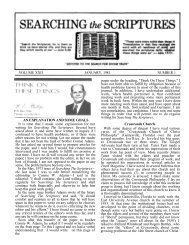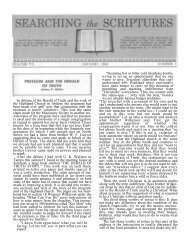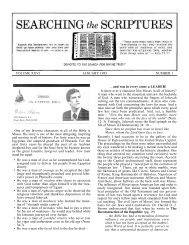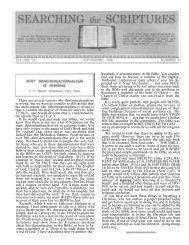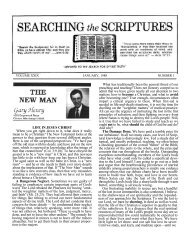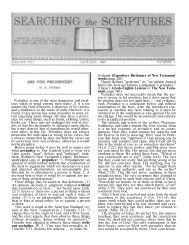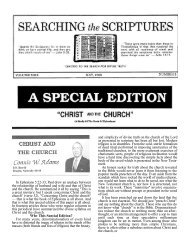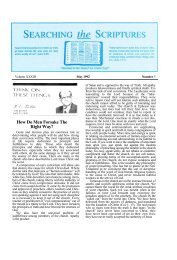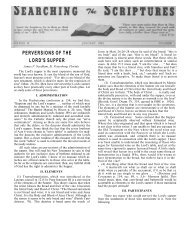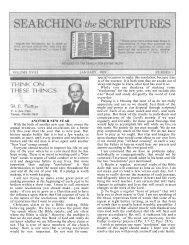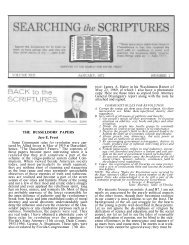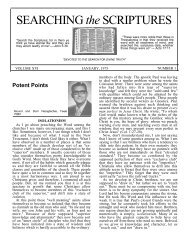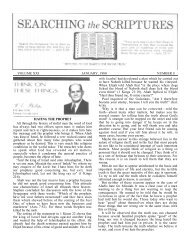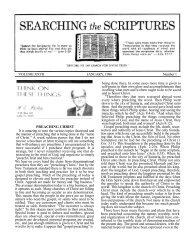Volume 31 – 1990 (PDF) - Searching The Scriptures
Volume 31 – 1990 (PDF) - Searching The Scriptures
Volume 31 – 1990 (PDF) - Searching The Scriptures
Create successful ePaper yourself
Turn your PDF publications into a flip-book with our unique Google optimized e-Paper software.
Page 4 ____________________________________________________________________________________________________<br />
way. We could see whether there was a proper balance<br />
between Old and New Testaments. Did we offer help on<br />
evidences? Was there a proper balance between textual<br />
study of the books of the Bible and topical studies to deal<br />
with practical issues confronting Christians? It was an<br />
eye-opening experience. Are Christians being equipped<br />
to take the message of the word of God and apply it to the<br />
problems of everyday life.<br />
(6) What is the evangelistic thrust of these classes?<br />
Are students near or over the age of accountability being<br />
taught what to do to be saved and motivated to act? What<br />
of visitors in classes who are not saved? Do we not bear<br />
some responsibility to them? Often, teachers, students<br />
or both, are insensitive to the needs of these and it is easy<br />
for lack of thoughtfulness to close their minds forever.<br />
Do we have classes which ignite the fires of evangelism<br />
in our young men and women? Are they being made<br />
aware of efforts to save the lost around the world and of<br />
what they can do to be a part of such worthwhile activity?<br />
Do our classes stimulate Christians to take the knowledge<br />
out of the classroom and into the mainstream of<br />
life? Do they move Christians to "teach faithful men who<br />
shall be able to teach others also" (2 Tim. 2: 2)?<br />
(7) Are there regularly scheduled teachers meetings<br />
where elders can monitor what is taking place, and<br />
where teachers can help each other sharpen their skills?<br />
Discussion with teachers in such settings can help elders<br />
greatly to spot areas of need, stay on top of situations<br />
before they get out of hand, and help them to evaluate<br />
the attitudes of teachers toward the scriptures and<br />
toward godly living. It is also a good setting in which to<br />
develop new teachers.<br />
This writer could be mistaken, and I hope that I am,<br />
but it appears to me that, as a whole, we are not as<br />
knowledgeable about the word of God as we ought to be.<br />
We are not the people of the book we once were. I know<br />
the usual excuses but they are no more acceptable now<br />
than they have ever been. It is still required that we<br />
"search the scriptures daily" (Acts 17: 11) and that we<br />
"study" (give diligence) to show ourselves "approved<br />
unto God, workmen that need not to be ashamed, rightly<br />
diving the word of truth" (2 Tim. 2: 15). Both pulpit and<br />
classroom must combine in instilling a knowledge of the<br />
word of God into the hearts of those who hear us. Eternal<br />
issues are at stake.<br />
In the process, let it not be forgotten that God requires<br />
"faithful" people to teach others. James said teachers<br />
shall receive "the heavier judgment" (James 3: 1). Morally<br />
weak, half-baked Christians have no business in the<br />
pulpit or the classroom in a teaching role. <strong>The</strong>y need to<br />
be genuinely converted first. Shortswearers, mixed<br />
bathers, social drinkers, cigarette puffers, profane and<br />
vulgar talkers and other worldlings are mighty poor<br />
examples of what believers ought to be. <strong>The</strong>ir students<br />
cannot be expected to rise to any higher level than the<br />
example of their teachers. Did I hear even a faint,<br />
distant, "Amen" somewhere?<br />
Introduction<br />
<strong>The</strong> purpose of this series of articles is to review and<br />
summarize some of the issues (not all of them) which<br />
have plagued the church, past and present. Such issues<br />
as institutionalism, the sponsoring church and church<br />
provision of recreation and entertainment are responsible<br />
for the division which has occurred within the<br />
ranks of God's people. Some of us, who have been on "the<br />
firing line" for about five decades in the struggle to keep<br />
the church free from these and other innovations, can<br />
make some obvious observations. An attitude is responsible<br />
for these and every other troublesome issue that<br />
has ever invaded the Lord's church. It is the same<br />
attitude that was responsible for the introduction of the<br />
Missionary Society and instrumental music in worship<br />
over a century ago. This attitude is the failure to regard<br />
and submit to divine authority. Every act of disobedience<br />
recorded in God's volume of inspiration, from the<br />
time of Adam and Eve in the beautiful bowers of Eden,<br />
is the consequence of this attitude. All must come to the<br />
recognition that God means what He says and says what<br />
He means. This includes respecting the silence of the<br />
<strong>Scriptures</strong>. Those, for instance, who use instrumental<br />
music in worship attempt to justify their practice on the<br />
ground that God did not say not to use it. By not<br />
respecting the silence of the <strong>Scriptures</strong> they thus defy<br />
divine authority. <strong>The</strong> New Testament simply does not<br />
authorize the use of instrumental music in worship. This<br />
should be reason enough to not employ it in our worship.<br />
Jesus Christ has ALL authority (Matt. 28: 18), and we<br />
are to abide in His teaching (2 Jno. 9). Only what He, His<br />
apostles and other inspired writers have authorized, are<br />
we permitted to do. This applies to the church as well as<br />
individuals. Authority has not been given to the church,<br />
but to Christ; therefore, the church is not permitted to<br />
act in any matter without the authority of its head, who<br />
is Christ (Col. 1: 187). When men do not submit to the<br />
authority of Christ, they will invariably turn to human<br />
reasoning; which in turn is substituted for the authority<br />
of Christ. <strong>The</strong> chief priests and elders questioned the<br />
authority of Jesus (Matt. 21: 23). When they could not<br />
answer His questions, "... they reasoned with themselves"<br />
(vs. 25). Basically, what constitutes authority is<br />
THE ISSUE in all controversies within the church.<br />
<strong>The</strong>re are issues as we know them, but AUTHORITY is<br />
the underlying issue.<br />
Modern innovations in the church are not "new under



